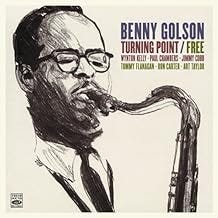Benny Golson – I Remember Benny
On Saturday September 21st, composer, arranger and tenor saxophonist Benny Golson passed at the age of ninety-five. His career spanned close to seventy years, beginning in the early 1950s, when, after attending Howard University, he worked in Bull Moose Jackson’s R&B band. It was there that Golson met one of the prime influences on his music, pianist and arranger Tadd Dameron. When Dameron started his own large band, Golson followed; working with him throughout much of the 1950s.
Dameron was (and remains) a legendary composer and arranger for larger ensembles and his influence on Golson’s writing and career cannot be overstated. Dameron brought out a growing interest in writing and melody that one can hear in the many jazz standards Golson would quickly begin writing for both Dameron’s band and others. Golson’s compositions such as “Stable Mates” I Remember Clifford”, “Killer Joe” and “Whisper Not” and more were all instant standards in the jazz repertoire upon their first introductions.
“Stable Mates” was the first of Golson’s composition to be recorded, though Golson himself would not play it on it’s inaugural recording. That distinction went to Miles Davis and John Coltrane when friend and fellow Philadelphian Coltrane took the tune to Miles for Miles’ first recording with what would become his first great Quintet (“The New Miles Davis Quintet” on Prestige / 1955).
The end of the big bands found Golson in New York, where he would record his first albums including “The Modern Touch”, “The Other Side of Benny Golson” and “Benny Golson Meets The Philadelphians” featuring Lee Morgan. For Lee Morgan, Golson played on and wrote all five tunes on Morgan’s own “Lee Morgan Volume 3” album (Blue Note / 1957). It was likely Morgan who brought Golson to drummer Art Blakey for a short stint with Blakey’s Jazz Messengers. The gig resulted in the Blakey album “Moanin’” (Blue Note / 1958). Four compositions out of the six that make up this stellar recording were written by Golson, including “Are You Ready”, “Along Came Betty” and “Blues March” and “Drum Thunder Suite”. The tunes, Golson’s arrangements and the stellar execution by everyone involved lift this album up to the level of a true masterpiece.
The subequent world-wide tour that Blakey’s Jazz Messengers embarked on was even captured on Japanese television, where we see Golson , Morgan and all performing the title tune:
Golson next joined forces with trumpeter Art Farmer to create The Jazztet – a sextet that showcased Golson and Farmer as lead soloists and took Golson’s arranging skills to the next level on such albums as “Big City Sounds”, “Another Git Together” and “Big City Sounds”. Golson also recorded a number of LPs under his own name, most notably “Turning Point” (Mercury / 1962)
When the Jazztet broke up several years later, Golson started writing, arranging and conducting for television including episodes of “It Takes a Thief”, “Mod Squad”, “The Partridge Family”, “Mission Impossible”, “M*A*S*H” and “Room 222”.
By the 1980s, Golson would return to the jazz world and reunite with Art Farmer in a new Jazztet on several LPs as well as later continuing touring and recording on his own and sometimes along with fellow Jazztet alum trombonist Curtis Fuller.
In 2004, Golson would make his film debut in the Tom Hanks’ movie “The Terminal” about an Eastern European tourist who inadvertently gets stuck in New York’s Kennedy Airport on his way to completing his late father’s jazz autograph collection.
Golson continued to tour and record into the 2010’s culminating with “European Tour 2019” (Blau Records / 2021) before the covid pandemic halted concert tours and festivals around the world. Golson’s continued musical power can be seen in this You Tube clip from Vienna around 2010:
There really isn’t anything more I can say regarding this musical giant except that he definitely will be remembered for his incalculable contributions to jazz and popular music.




